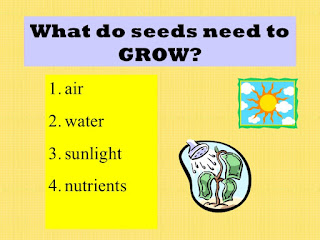The Science of Plant Growth
What do plants need to grow ?
Plants need water, air, nutrients, and sunlight to grow. The energy from sunlight is used to chemically change water and carbon dioxide (air) into sugar. This process is called photosynthesis. A waste product from photosynthesis is oxygen.
Photosynthesis
Photosynthesis is a process used by plants and other organisms to convert light energy (normally from the Sun) into chemical energy that can be later released to allow the plant to grow and repair cells.
Air :

Just like us, plants need air to live. Plant leaves use carbon dioxide from the air to make sugars and starches for the plant to use as food. Another plant part that needs air is the roots. Plant roots need oxygen to stay healthy and to do their job of gathering water and nutrients for the plant.
Water :
 Water is critical in order for plants to carry out photosynthesis. Water enters a plant's stem and travels up to its leaves, which is where photosynthesis actually takes place. Once in the leaves water evaporates, as the plant exchanges water for carbon dioxide.
Water is critical in order for plants to carry out photosynthesis. Water enters a plant's stem and travels up to its leaves, which is where photosynthesis actually takes place. Once in the leaves water evaporates, as the plant exchanges water for carbon dioxide.
Sunlight:
All plants need sunlight to make food (glucose) in a process called photosynthesis.
Nutrients :
 Plants need 17 elements for normal growth. Carbon, hydrogen, and oxygen come from the air and water. Soil is the principle source of other nutrients. Key nutrients (nitrogen, phosphorus, and potassium) are used in large amounts by plants, and often are supplemented as fertilizers.
Plants need 17 elements for normal growth. Carbon, hydrogen, and oxygen come from the air and water. Soil is the principle source of other nutrients. Key nutrients (nitrogen, phosphorus, and potassium) are used in large amounts by plants, and often are supplemented as fertilizers.
Air + Water + Sunlight + Nutrients = Plant Growth

Products of Photosynthesis
And that is how Plants Grow !!!







No comments:
Post a Comment